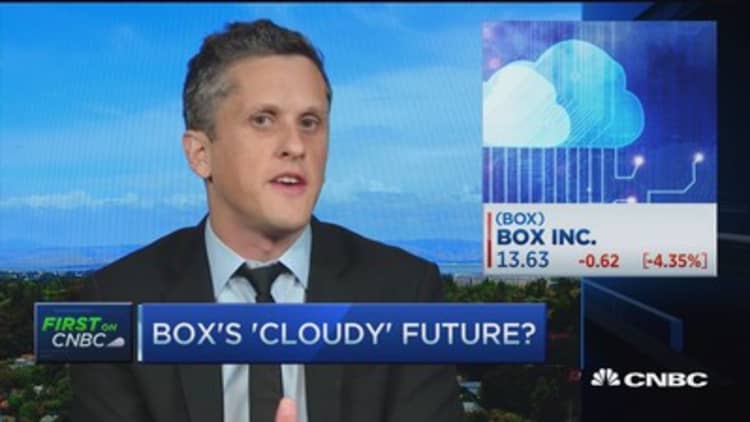Dropbox is at a crossroads.
Since raising money at an eye-popping in early 2014, the online storage and file-sharing start-up has focused on parlaying its expertise in consumer products — it has over 400 million global users — into an offering for the business software world.
To this end, security, authentication and device management tools are being rolled out by the same company that wants you to share your kids' birthday photos with friends and family members.
The challenge is massive. Dropbox's appeal is its dead-simple way to sync and send big files, including videos and slideshows, from any device. That also happens to be an Information Technology department's worst nightmare, and one that Dropbox has yet to reconcile.
According to a report released Tuesday by mobile device management company MobileIron, Dropbox is the most blacklisted app among the vendor's base of 10,000 commercial customers. Five of the 10 most-banned apps are in the file sync and sharing areas, including Microsoft OneDrive, Google Drive and Box, while the rest are in the category of productivity killers, like Angry Birds and Facebook.
"They lose visibility of that enterprise data," said Mike Raggo, director of security research at MobileIron, referring to sharing apps such as Dropbox. The "concern is that enterprises see that data wandering away."
Apps in the workplace
| Top blacklisted | Most deployed |
| Dropbox | Salesforce |
| Angry Birds | Goodreader |
| Microsoft Office Suite | |
| Microsoft OneDrive | Cisco AnyConnect |
| Google Drive | Box |
| Box | Cisco WebEx |
| Skype for Business | |
| Google Docs | |
| Skype | Evernote |
| SugarSync | Xora Mobile Worker |
Source: Source: MobileIron
The San Francisco-based company will address these issues head-on at an event on Wednesday called Dropbox Open, featuring a keynote from chief executive Drew Houston and guest appearances from Salesforce.com CEO Marc Benioff and Apple software guru Eddy Cue. The invitation tells users they'll "walk away with actionable insights to help your team collaborate more effectively and securely."
Dropbox is clearly playing catch-up. Looking at MobileIron's survey, Microsoft, Google and Box have enterprise products that are among the 10 most widely deployed apps, even though their consumer versions are heavily blacklisted. Dropbox tops the blacklist but doesn't crack the top 10 of the good list.
And winning big business deals is critical for Dropbox. The consumer market is getting rapidly commoditized, with Apple and Google perfectly willing to lose money on storage in order to retain users.
Read MoreApple crushes earnings, tops iPhone sales
Without a vibrant enterprise business, Dropbox's valuation—the seventh highest among U.S. venture capital-backed start-ups—is hard to justify. After all, the vast majority of its 400 million users don't pay anything.
Dropbox is hard at work on the problem, and the results are showing.
Since introducing Dropbox for Business two years ago, and selling it for $12.50 per user per month, the product has attracted 100,000 paying customers. The software lets IT departments manage employee accounts and remotely wipe data if devices are lost or stolen. And in June, Dropbox said it was working with security vendors including MobileIron and VMware's AirWatch to integrate its app into secure corporate networks.
A report late last year from 451 Research found that Dropbox was the most popular paid enterprise file-sync and share service, ahead of offerings from Microsoft, Google and Box. However, the number of customers doesn't equal revenue, and Box CEO Aaron Levie points out that at the biggest companies, with 10,000 or more employees, Box has much greater traction.
Still, the enterprise business is Dropbox's fastest growing unit, said Ross Piper, Dropbox's vice president. In deals that involved at least 1,000 employees, Dropbox was seeing 400 percent annual growth, he said.
So what explains the poor showing in the MobileIron survey?
MobileIron is strongest in highly regulated industries including health care, financial services and government, where cloud apps have a higher bar to clear.
In those markets, Dropbox has struggled to gain the confidence of IT administrators. But Piper highlights big customers like News Corp., Yahoo and Spotify in media and technology and major education clients like the Massachusetts Institute of Technology (Houston's alma mater) and the University of Oklahoma.

"Media, tech, retail and education are our largest and highest growth industries," Piper said.
The partnership with MobileIron is brand new, and the whole purpose is to get into companies with the most sensitive data to protect.
Attendees at the Dropbox event on Wednesday can expect to hear plenty more along those lines, including partnership updates with security vendors. Sessions will focus on the changing security landscape, employee collaboration, product adoption and customer success.
These are all important steps for Dropbox to be a relevant player in enterprise software. But it doesn't mean they'll work.
Read MoreWhat does the stalled Dropbox IPO say about tech?
Like the consumer storage market, the business landscape is littered with competitors. Just look at Box, which is spending 80 percent of its quarterly revenue on sales and marketing to compete with the likes of Microsoft, Google, and Citrix.
Andres Rodriguez, CEO of cloud storage vendor Nasuni, calls Dropbox a "victim of its own success."
The product, which launched in 2008, was such a hit with consumers that it infiltrated work environments way before security departments were ready..
"When it was still early in the adoption cycle, IT was willing to either turn a blind eye or accommodate super users," Rodriguez said. "I've seen a real shift in the past year. Companies are saying this is causing a major concern and have either shut it down or are looking at how to contain it."
Whether Dropbox can provide the solution is the $10 billion question.
Update: MobileIron reported earnings today and said its customer count has now surpassed 10,000.



